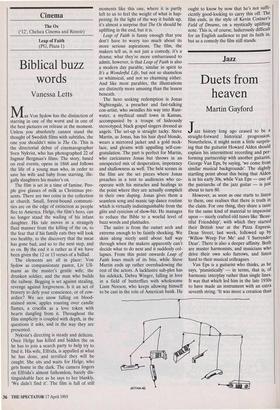Cinema
The Ox (`12', Chelsea Cinema and Renoir) Leap of Faith (PG, Plaza 1)
Biblical buzz words
Vanessa Letts
Max Von Sydow has the distinction of starring in one of the worst and in one of the best pictures on release at the moment. Unless you absolutely cannot stand the thought of Swedish films with subtitles, the one you shouldn't miss is The Ox. This is the directorial debut of cinematographer Sven Nykvist, who has photographed 22 of Ingmar Bergman's films. The story, based on real events, opens in 1868 and follows the life of a young man who, in order to save his wife and baby from starving, ille- gally slaughters his master's ox.
The film is set in a time of famine. Peo- ple give glasses of milk as Christmas pre- sents. There are two coins in the collection at church. Small, forest-bound communi- ties are on the edge of extinction as people flee to America. Helge, the film's hero, can no longer stand the wailing of his infant daughter. His tale moves in a strangely fluid manner from the killing of the ox, to the fear that if his family eats they will look too healthy, to the discovery that the meat has gone bad, and so to the next step, and so on. By the end it is rather as if we have been given the 12 or 13 verses of a ballad.
The elements are all in place: Von Sydow as compassionate pastor, Liv Ull- mann as the master's gentle wife; the drunken soldier, and the man who builds the railway. Begging is set against stealing, revenge against forgiveness. Is it an act of bravery to defy your conscience, or of cow- ardice? We see snow falling on blood- stained snow, apples roasting over candle flames, a crucifix as a love token with hearts dangling from it. Throughout the film simplicity is coupled with depth, in the questions it asks, and in the way they are presented.
Nykvist's directing is steady and delicate. Once Helge has killed and hidden the ox he has to join a search party to help try to find it. His wife, Elfrida, is appalled at what he has done, and terrified they will be caught. She sits and waits for Helge, who gets home in the dark. The camera lingers on Elfrida's almost fathomless, barely dis- tinguishable face as he says to her blankly, `We didn't find it'. The film is full of still moments like this one, where it is partly left to us to feel the weight of what is hap- pening. In the light of the way it builds up, it's almost a surprise that The Ox should be uplifting in the end, but it is.
Leap of Faith is funny enough that you don't have to worry too much about its more serious aspirations. The film, the makers tell us, is not just a comedy, it's a drama; what they're more embarrassed to admit, however, is that Leap of Faith is also a modern day parable, similar in spirit to It's a Wonderful Life, but not so shameless or whimsical, and not so charming either. And like most parables, the illustrations are distinctly more amusing than the lesson beneath.
The hero seeking redemption is Jonas Nightengale, a preacher and fast-talking con-artist, who swindles his way into Rust- water, a mythical small town in Kansas, accompanied by a troupe of hideously stereotyped, black gospel singers dressed as angels. The set-up is straight tacky. Steve Martin, as Jonas, has his hair dyed blonde, wears a mirrored jacket and a gold neck- lace, and gleams with appalling self-con- gratulation. The part is perfect for Martin, who caricatures Jonas but throws in an unexpected mix of desperation, impotency and shallowness as well. The best scenes in the film are the set pieces where Jonas preaches in a tent to audiences who co- operate with his miracles and healings to the point where they are actually complicit in their own duping. Jonas gives them a seamless song and manic tap dance routine which is virtually indistinguishable from the glitz and cynicism of show-biz. He manages to reduce the Bible to a woeful level of buzz words and platitudes.
The satire is from the outset arch and extreme enough to be faintly shocking. We skim along nicely until about half way through when the makers apparently can't decide what to do next and it suddenly col- lapses. From this point onwards Leap of Faith loses much of its bite, while Steve Martin ends up rather overshadowing the rest of the actors. A lacklustre sub-plot has his sidekick, Debra Winger, falling in love in a field of butterflies with wholesome Liam Neeson, who keeps allowing himself to be cast in the role of American hunk. He ought to know by now that he's not suffi- ciently good-looking to carry this off. The film ends, in the style of Kevin Costner's Field of Dreams, on a mystically uplifting note. This is, of course, ludicrously difficult for an English audience to put its faith in, but as a comedy the film still stands.


















































 Previous page
Previous page